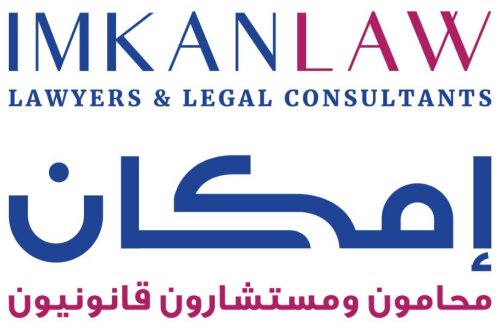Best Sustainable Finance Lawyers in Hashemite Kingdom of Jordan
Share your needs with us, get contacted by law firms.
Free. Takes 2 min.
Or refine your search by selecting a city:
List of the best lawyers in Hashemite Kingdom of Jordan
About Sustainable Finance Law in Hashemite Kingdom of Jordan
Sustainable finance refers to financial services that incorporate environmental, social, and governance (ESG) criteria into business and investment decisions to promote sustainable economic growth. In the Hashemite Kingdom of Jordan, sustainable finance is gaining momentum as part of the country’s broader commitment to sustainable development and alignment with international environmental goals, such as the Paris Agreement and the United Nations Sustainable Development Goals (SDGs). The Jordanian government, financial sector regulators, and industry bodies have begun to issue frameworks and policies that promote responsible investment, green bonds, and ESG disclosures across banking, capital markets, and corporate environments.
Why You May Need a Lawyer
Navigating the legal landscape of sustainable finance can be complex. Individuals, companies, and investors may seek legal assistance for several reasons, including:
- Understanding the regulatory requirements for launching green bonds or sustainable financial products
- Ensuring compliance with ESG reporting obligations issued by local authorities or stock exchanges
- Assessing environmental and social risks in project finance or investment processes
- Handling disputes related to greenwashing or misrepresentation in sustainable products
- Structuring joint ventures or partnerships that seek to advance sustainability projects in Jordan
- Advising on government incentives, subsidies, or penalties relating to sustainable practices
- Negotiating contracts with ESG clauses or with international development finance institutions
Local Laws Overview
The Kingdom of Jordan has taken significant steps toward integrating sustainable finance into its regulatory framework. Some key aspects of local law relevant to sustainable finance include:
- Central Bank of Jordan Initiatives: The Central Bank of Jordan (CBJ) has introduced guidelines to encourage green lending, including reduced reserve requirements for loans to renewable energy and environmentally-friendly sectors.
- Jordan Securities Commission (JSC) ESG Disclosure Requirements: The JSC is increasingly focusing on ESG disclosures for listed companies, aligning with global trends in transparency and sustainable reporting.
- Green Bond Framework: Jordan has developed frameworks for green bonds, allowing both public and private sectors to raise capital specifically for environmental projects, such as renewable energy or clean water infrastructure.
- Public-Private Partnerships Law: Legislation governing public-private partnerships supports sustainable project finance for infrastructure, energy, and environmental protection.
- Investment Law Incentives: The Jordan Investment Commission offers incentives for projects that support sustainable development, including streamlined licensing and tax benefits for renewable energy and environmental initiatives.
- Environmental Law Compliance: All financial and investment projects must comply with Jordanian environmental laws and regulations, which are overseen by the Ministry of Environment.
Frequently Asked Questions
What is sustainable finance and how is it applied in Jordan?
Sustainable finance in Jordan incorporates environmental, social, and governance factors into investing, lending, and commercial decision making. This approach is being fostered through policy initiatives, green finance products, and increased ESG disclosure among corporations and banks.
Are there any specific regulations governing green bonds in Jordan?
Yes, the Jordan Securities Commission and Central Bank of Jordan have issued guidelines and frameworks for structuring and issuing green bonds, particularly for renewable energy and environmental projects.
What reporting obligations do companies face regarding ESG in Jordan?
Listed companies are increasingly expected to provide ESG disclosures, and more detailed requirements may apply depending on sector and regulatory body. Local stock exchanges and the JSC provide guidance on reporting standards.
Can foreign investors participate in sustainable finance projects?
Yes, foreign investors can participate in sustainable projects, including green infrastructure and renewable energy, often with favorable terms and incentives provided by the government for sustainability-focused investments.
How do I verify that a financial product in Jordan is truly sustainable or “green”?
Verification typically involves reviewing the product’s compliance with recognized green bond frameworks, third-party certifications, and adherence to local ESG disclosure requirements. Independent experts or legal advisors can assist in due diligence.
What legal risks are associated with greenwashing in Jordan?
Greenwashing - making false or exaggerated claims about a product’s or service’s environmental benefits - can result in penalties, civil liability, reputational damage, and regulatory scrutiny under consumer protection and financial laws.
Are there incentives for launching sustainable projects in Jordan?
Yes, the government, through the Investment Commission and other bodies, offers incentives such as tax benefits, expedited licensing, and technical support for sustainability-oriented projects, especially in renewable energy and clean technology.
How do ESG factors impact corporate governance in Jordan?
ESG factors are increasingly integrated into corporate governance, influencing board structures, risk management, and strategic direction to ensure long-term viability and regulatory compliance.
What is the role of the Central Bank of Jordan in promoting sustainable finance?
The Central Bank of Jordan promotes sustainable finance by issuing guidelines, supporting green loans, monitoring risk, and collaborating with financial institutions to adopt ESG principles in banking and lending.
Do I need a lawyer to participate in sustainable finance activities in Jordan?
While not always legally required, having a lawyer ensures that you comply with rapidly evolving regulations, manage risks, draft legally sound contracts, and secure your investments in the sustainable finance sector.
Additional Resources
If you need more information or support on sustainable finance in Jordan, consider contacting:
- Jordan Securities Commission (JSC)
- Central Bank of Jordan (CBJ)
- Jordan Investment Commission
- Ministry of Environment
- Jordan Green Building Council
- Local law firms with expertise in ESG and financial regulation
- International Finance Corporation (IFC) - Regional initiatives
- Chambers of Commerce and Business Associations interested in sustainability
Next Steps
If you are considering engaging in sustainable finance or have legal questions in this area, take the following steps:
- Clearly identify your needs - for example, project financing, ESG disclosures, or contract review
- Gather relevant documents, including business plans, regulatory correspondence, and investment materials
- Consult authoritative resources and contact relevant governmental bodies for preliminary guidance
- Seek recommendations or search for a lawyer specializing in sustainable finance, ESG, or financial regulation in Jordan
- Schedule a consultation to discuss your goals, regulatory concerns, and compliance requirements
- Work closely with your lawyer to develop compliant, practical, and sustainable financial solutions
Addressing legal issues early and with expert guidance will help you make the most of the evolving sustainable finance landscape in the Hashemite Kingdom of Jordan.
Lawzana helps you find the best lawyers and law firms in Hashemite Kingdom of Jordan through a curated and pre-screened list of qualified legal professionals. Our platform offers rankings and detailed profiles of attorneys and law firms, allowing you to compare based on practice areas, including Sustainable Finance, experience, and client feedback.
Each profile includes a description of the firm's areas of practice, client reviews, team members and partners, year of establishment, spoken languages, office locations, contact information, social media presence, and any published articles or resources. Most firms on our platform speak English and are experienced in both local and international legal matters.
Get a quote from top-rated law firms in Hashemite Kingdom of Jordan — quickly, securely, and without unnecessary hassle.
Disclaimer:
The information provided on this page is for general informational purposes only and does not constitute legal advice. While we strive to ensure the accuracy and relevance of the content, legal information may change over time, and interpretations of the law can vary. You should always consult with a qualified legal professional for advice specific to your situation.
We disclaim all liability for actions taken or not taken based on the content of this page. If you believe any information is incorrect or outdated, please contact us, and we will review and update it where appropriate.
Browse sustainable finance law firms by city in Hashemite Kingdom of Jordan
Refine your search by selecting a city.
















